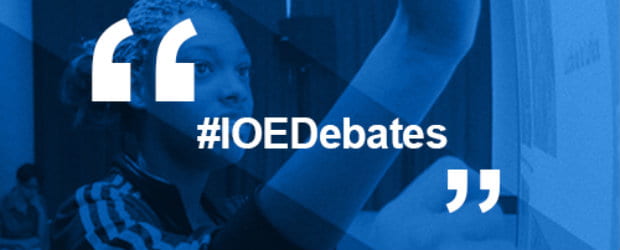Arts education: how can we bring it out from the wings and into the spotlight?
By Blog Editor, IOE Digital, on 18 June 2021
18 June 2021
By IOE Events
Our latest debate took a look at arts education: why it matters, how it’s been pushed to the margins, and how to bring it back centre stage. To review those question we were joined by an expert cast of education and public affairs professionals: art and textiles teacher (and 2018 Global Teacher Prize winner, and IOE alum) Andria Zafirakou, primary art specialist Emily Gopaul, IOE researcher Isobel Traunter, Public First director, Ed Dorrell, and our chair for the discussion, Dominic Wyse, Professor of Early Childhood and Primary Education at the IOE and researcher on creativity (read more about our panellists).
Arts education, encompassing art, dance, design, drama and music, is widely regarded as vital to a ‘well rounded education’. Alongside the development of particular cognitive skills and aptitudes, studying these subjects has been shown to benefit physical and mental health, the transferable skills that employers increasingly look for, as well as appreciation of difference and diversity. Yet, if we look at teacher numbers, teaching hours and exam entries we see just how much coverage of these subjects in schools – particularly the performing arts – has shrunk over the past decade.
The exam figures are especially stark: between 2010 and 2020 the number of arts GCSE and A-level entries fell by a third. We can’t yet say what the impact of the Covid-19 pandemic will be. For now, the therapeutic role of engagement with the arts has come to the fore as a response to the mental health impacts of the past year on young people. Will that last? Can the therapeutic function of arts education boost its profile over the longer term? On that, our discussion drew out points of divergence in the priorities of arts educators and arts advocacy and the narratives that might resonate more powerfully with other audiences, from policy makers to parents.
In contrast to the prevailing emphasis on ‘academic’ subjects and ‘employability’ narrowly defined, the elements of arts subjects that their teachers – and their pupils – treasure are framed rather differently. Providing space for reflection and expression, giving young people a sense of agency and voice as creative producers, and celebrating pupils’ diverse cultural heritage as a starting point for creative projects, were all highlighted.
These practitioners want to see greater school leader support for these aspects of schooling, more teacher CPD, especially for primary teachers, to assist them in moving beyond the tried and tested and the Western cannon, as well as universities and employers being more vocal about the value of arts subjects to a wide range of careers, from the booming games sector to many other jobs beyond the creative and cultural industries themselves.
 Understandably, arts educators begrudge the way their subjects are positioned in opposition to ‘core’ concerns of literacy and numeracy, as well as having to justify their subjects through their contribution to other agendas. But is there a case for telling a different kind of story about arts education, even if that involves playing to the priorities of politicians (and those who elect them, many of whom are parents anxious about their children’s futures)? Such a story would emphasise the discipline, skill, rigour and mastery involved in arts subjects, as well as its contribution to the kinds of cultural capital that can open doors for young people. This might even be an optimum moment to reassess the script, as parents see greater value in curriculum breadth in the aftermath of the pandemic and as new Ofsted inspection frameworks, in theory at least, push at the same door. Can, or should, arts educators and advocates get behind a different soundtrack?
Understandably, arts educators begrudge the way their subjects are positioned in opposition to ‘core’ concerns of literacy and numeracy, as well as having to justify their subjects through their contribution to other agendas. But is there a case for telling a different kind of story about arts education, even if that involves playing to the priorities of politicians (and those who elect them, many of whom are parents anxious about their children’s futures)? Such a story would emphasise the discipline, skill, rigour and mastery involved in arts subjects, as well as its contribution to the kinds of cultural capital that can open doors for young people. This might even be an optimum moment to reassess the script, as parents see greater value in curriculum breadth in the aftermath of the pandemic and as new Ofsted inspection frameworks, in theory at least, push at the same door. Can, or should, arts educators and advocates get behind a different soundtrack?
You can watch the debate in full and decide for yourself here.
 Close
Close




